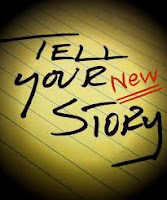Holding Space for Elders
Recently
I developed and facilitated two Writing Groups for Elders in my local
community. I believed it was important for them to explore topics and emotions that might normally remain hidden, for healing in their 3rd Chapter. To hear others' stories and realise that they are not alone.
beginnings . . .
I set about creating a safe container for these feelings and stories to flow, in a non-judgmental way, where they could feel safe in sharing their life if they chose to. They also had the opportunity to practise writing more creatively.
I set about creating a safe container for these feelings and stories to flow, in a non-judgmental way, where they could feel safe in sharing their life if they chose to. They also had the opportunity to practise writing more creatively.
The feedback from participants has been encouraging, and positive. And I am grateful for their trust in me, in each other, and their own process.
One
said she "liked
the topics and themes that you suggested for us and the quotes and
poems were a bonus...I loved the warm feeling that was created in the
group and I think one of the reasons for this was the way we were led
into some deep little recesses of our lives that we felt secure
enough to share with the others because of the 'keys' that you gave
us in your guidance."
the facilitating . . .
I've held space for many, many clients over the years, facilitated an Art Therapy group, co-facilitated a women's circle, but have never facilitated any class before in a formal setting, with a group of people and a variety of personalities. At times the learning curve was rather steep.
I've held space for many, many clients over the years, facilitated an Art Therapy group, co-facilitated a women's circle, but have never facilitated any class before in a formal setting, with a group of people and a variety of personalities. At times the learning curve was rather steep.
With
my gathered years and experience, with my heart open, I didn't foresee any challenges.
Only a little anxiety about putting on a new hat - holding space for
my peers. A
time to tune into their feelings and experiences, to write about them, and share. Simple. Aha.. There I made an assumption!
I
was so passionate about my project that it didn't enter my
consciousness to consider anything but smooth sailing, though given the topics I chose for them, it was clear they would be tapping into some deep feelings - grief, loss, longing, etc. After an experience when I appeared to show too much empathy, I
quickly gathered myself and tossed the Therapy hat in the bin! I took
the middle path - not as a teacher or a therapist, but a facilitator,
whatever that means.
I
shared with a friend how things were for me. She was empathetic but
said that "teachers have to develop a tough skin". This
felt alien to me. Firstly, I'm not a teacher, per se, but a
therapist. I value my highly tuned senses that a tough skin would
affect as it would inhibit my ability to tune into the subtle nuances
and non-verbal behaviour. Having said that, perhaps there is a middle
way.
After
much reflection and research on this topic, holding this space has
also been a valuable one for me. I've learned heaps! About myself,
and about my peers. Understanding
as I do with clients, if one is
still running their child story, then the child is bound to come out
to 'play', and some transference can occur.
It would be my guess, though intuitively I had a sense, that in nearly
every one of my participants, mother love, or the lack of (neglect,
abandonment, not understood, needs not met), was a factor in whether
they felt relatively at peace in their elder years, or not. As mothering is often a tough role to play, I had immense empathy having experienced my own challenge.
As
most of us live in stories designed by our 3 year old, we can stay trapped. There are many voices and selves that propel
us subsconsciously to behave in ways that our reasoning mind would
not. And these outdated narratives are still causing some misery in
elder years. Also, we're often carrying around a backpack of stuff
from our past lives to further inhibit us.
So,
how would I hold the space differently next time?
I
would put my Therapy cap back on, when appropriate! As I began with a
deep respect for my peers, I would not assume, whatever age someone
is, that they have 'done the work'.
I would weave into the exercises, more theory and therapeutic insight of how our stories influence our present lives, and hinder us from feeling fulfilled. Without even our adult selves being aware!
I would weave into the exercises, more theory and therapeutic insight of how our stories influence our present lives, and hinder us from feeling fulfilled. Without even our adult selves being aware!
Life
is a story we tell to others, and it plays out in our life, in our behaviour and actions. So if we can change our story, we'll get to experience life
differently. I would also help my participants "learn how to
distinguish whether they're living in an adult narrative or one crafted by the mind of a child" (Rosamund Stone Zander). If they were of the latter, I'd
encourage them to shift themselves into a new story, thus liberating
them to live with more contentment, peace and wellbeing.
As upgraded
stories are catalysts for transformation, rewriting our stories in
elderhood should have a flow on effect to our future generations, changing the patterns and offering a new story of elderhood.





Comments
Post a Comment